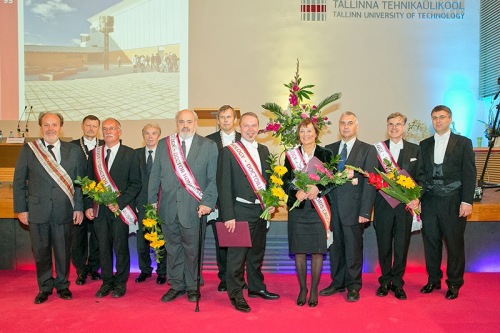Honorary doctorate for Prof. Hans-Werner Schock

Prof. Hans-Werner Schock (3.f.l.) receives the honorary doctorate at University of Tallinn.
Tallinn University of Technology (TTU) has named Prof. Hans-Werner Schock recipient of an honorary doctorate in recognition of Schock’s achievements during TTU’s integration into the Western research community after the 1990 fall of the Iron Curtain.
According to Schock, “TTU was already actively conducting research on monograin layer solar cells way before 1990.” Once the Iron Curtain came down, it was necessary to integrate solid Eastern European research sites like Tallinn into the European research community.
“At the time, I was coordinator for a major EU project and had the chance to win over Estland with TTU as one of our partnering institutes,” says Schock. This marked the beginning of a regular success story: The TTU Institute of Materials Science quickly became integrated in the wet european research alliances and built up a solid international reputation for itself. Schock continued to collaborate with TTU over the years: “At this point, TTU has established itself as an important player in photovoltaics research – our collaboration has consistently proven very fruitful.”
Today, the university is internationally ranked among the very top. Hans-Werner Schock is the man to thank for giving the initial impulse back in the 90’s. Reason enough for TTU to bestow upon him their honorary doctorate in mid-September of this year.
HS
https://www.helmholtz-berlin.de/pubbin/news_seite?nid=13843;sprache=en
- Copy link
-
New Helmholtz Young Investigator Group at HZB on perovskite solar cells
Silvia Mariotti is returning to HZB as head of the new Helmholtz Young Investigator Group ‘Perovskite-based multi-junction solar cells’. The perovskite expert, who was previously based at Okinawa University in Japan, aims to advance the development of multi-junction solar cells made from different perovskite layers.
-
Hydrogen storage in MXene: It all depends on diffusion processes
Two-dimensional (2D) materials such as MXene are of great interest for hydrogen storage. An expert from HZB has investigated the diffusion of hydrogen in MXene using density functional theory. This modelling provides valuable insights into the key diffusion mechanisms and hydrogen's interaction with Ti₃C₂ MXene, offering a solid foundation for further experimental research.
-
HZB and National University Kyiv-Mohyla Academy start cooperation in Energy and Climate
Helmholtz-Zentrum Berlin für Materialien und Energie GmbH (HZB) and the National University of "Kyiv-Mohyla Academy" (NaUKMA) have signed a Memorandum of Understanding (MoU). The MoU serves as the starting point for collaborative research, academic exchange, and capacity-building between the two institutions. Actions will be taken to establish the Joint Research and Policy Laboratory at NaUKMA in Kyiv. The aim of the future laboratory is to jointly develop research and policy analysis, focusing on the energy and climate dimensions of Ukraine’s EU integration.
